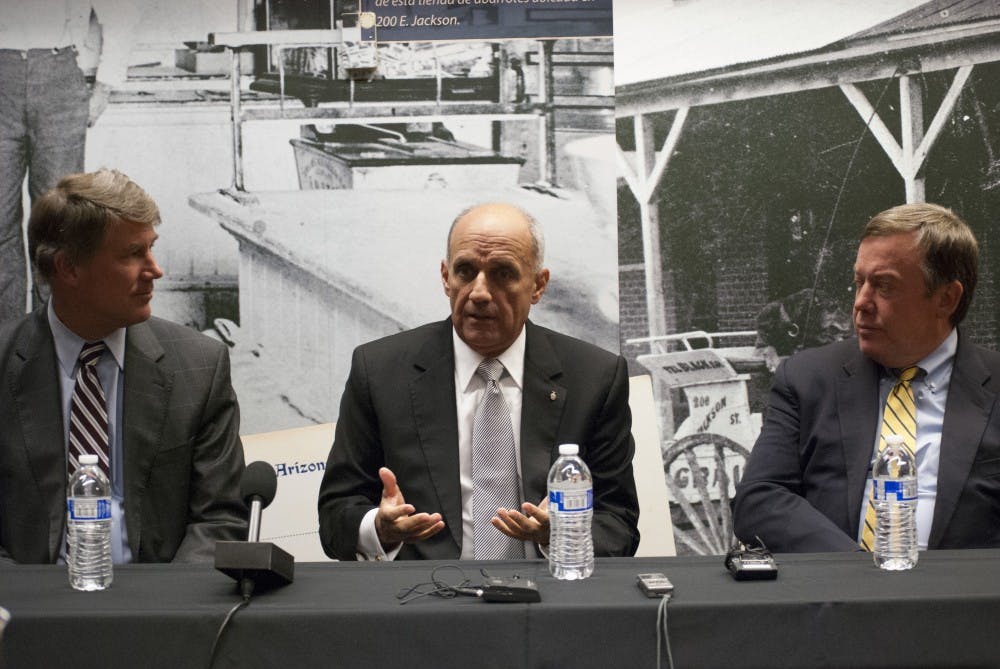 Arizona Vice President of the Mayo Clinic, Wyatt Decker, President Michael Crow, and Dr. Richard Carmona, announce an agreement to expand the current partnership between ASU and the Mayo Clinic, Thursday evening at the Arizona Science Center . Former U.S Surgeon General, Richard Carmon, lead a discussion on the future of Health Care, and the role ASU wants to take in building that future. (Photo by Murphy Bannerman)
Arizona Vice President of the Mayo Clinic, Wyatt Decker, President Michael Crow, and Dr. Richard Carmona, announce an agreement to expand the current partnership between ASU and the Mayo Clinic, Thursday evening at the Arizona Science Center . Former U.S Surgeon General, Richard Carmon, lead a discussion on the future of Health Care, and the role ASU wants to take in building that future. (Photo by Murphy Bannerman)Around 350 people packed into the Arizona Science Center on Wednesday evening to listen to a discussion between three leading innovators and two leading institutions in the world of health care delivery and education.
The speakers for the evening included former U.S. Surgeon General Richard Carmona, ASU President Michael Crow and Mayo Clinic Vice President and CEO in Arizona Dr. Wyatt Decker.
The two institutions are collaborating to provide better health care in the future by changing the way they educate students and by applying a new approach to the medical field to train better prepared doctors, nurses technicians and researchers in the future.
“We want a more adaptive health outcome and health care oriented workers,” Crow said. “In our case, that means launching a new school for health care delivery working with the Mayo Clinic as they expand to a new school here in Arizona.”
The Mayo Clinic and ASU have been clinical partners for the past 10 years. The collaboration takes the major strengths of each institution – ASU’s leadership in research and Mayo’s extensive medical experience – to provide better care for patients and better education for doctors.
The schools are looking to prepare workers for the new age of medicine and research.
The ASU-Mayo collaboration is unlike any other in the nation and a bright spot in the field of medical research, Carmona said.
“The partnership between Mayo and ASU is really unprecedented,” he said. “You have an iconic brand in health which is undisputedly the No. 1 brand in the world in health and you have a university which is increasingly becoming the preeminent university in the United States.”
Carmona lauded the determination of each institution’s activeness and no-holds-barred approach to the new field of medicine.
“They are not afraid to be disruptive, not afraid to be entrepreneurial and innovative and want to bring the best practices to the table,” he said.
Each member of the panel agreed changes in medical education needs to take place.
“Our doctors being trained in this country with the right tools and skill sets to be able to address this crisis in health care, we would say they are not,” Decker said.
By training doctors and others in the medical field in this new approach will change health care overall in the U.S. but it needs to start now.
“Changes in medical education have not kept up with the needs of society or the changes in health care,” Decker said. “We’re having much discussion about the Affordable Care Act and I would suggest we broaden that out to just cost of care in the United States.”
The Affordable Care Act will soon be impacting the health care industry and ASU, along with the Mayo Clinic, are at the forefront of what needs to be done to make it work.
“The Affordable Care Act is highlighting the need for innovation and we are providing that innovation,” Crow said. “Overall what we’re looking to do is what we see as a moment of innovation.”
This effort to launch a Mayo medical school in Arizona on a national platform partnering up with not just ASU but with the University of Minnesota Medical School will redefine medical education which is yet to be done, Decker said.
To begin the new collaboration between the institutions, Dr. Crow laid out what has been happening in the early stages.
“We’re building the first of its kind school of science of health care delivery,” he said. “We hired Dr. Bill Riley from the University of Minnesota School of Public Health and a range of other leading academics, physicians, scientists, economists, and engineers.”
These added faculty members will help build what the health care system needs, not just doctors and nurses but all aspects of the system.
“What we’re constructing is all the other things advanced health care needs besides medicine,” he said.
The success of this new collaboration is yet to be seen but Carmona, Decker and Crow said they are very optimistic about what is to come, and where they can go with the changes being started by this one small group.
“It all starts with one idea starting somewhere, testing it out, proving it out, seeing it forward and yes, there are over 140 medical schools out there, but Mayo is taking this path of launching a new medical school in a new way,” Crow said. “The notion is you have to start somewhere.”
Reach the reporter at jshanco2@asu.edu or on Twitter @joey_hancock




